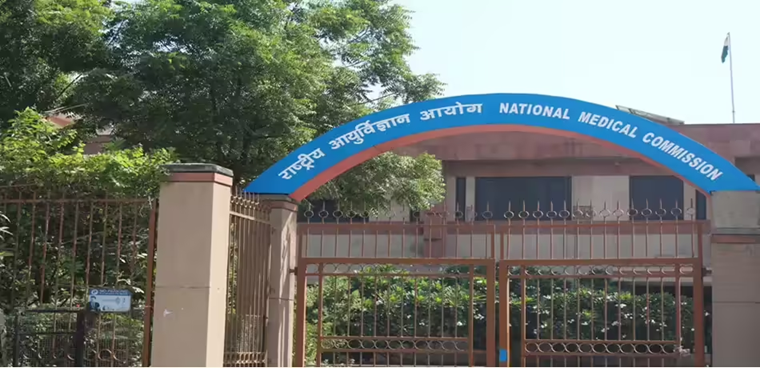
New Delhi: The National Medical Commission has said that live broadcast of surgeries should not be used for promotion of the operating surgeon, hospital or product brand and the patient’s consent must be taken before such an endeavour.
In its detailed guidelines issued this week to regulate the conduct and broadcast of live surgeries, the commission said that surgeons should not have a financial or commercial interest in the devices used during the operation.
“Live broadcasts should strictly serve educational purposes and not for commercial gain or promotion. Surgeons should avoid glorification, and the focus should be on surgical techniques and patient care,” the norms said.
Complications and risks associated with live broadcasts should be addressed through stringent regulations and insurance coverage, it stressed.
The National Medical Commission (NMC) stated that while a live surgery can be educational, it may not provide the same depth of learning as interactive or hands-on training.
Live surgery, in any case, may seem valuable for experiential learning, but it lacks concrete evidence supporting its educational effectiveness when compared to pre-recorded surgical videos.
Pre-recorded videos offer better frame-by-frame analysis, video editing, and labelling, enhancing the educational experience, the NMC pointed out.
There are ethical issues regarding the use of patients for educational purposes. The educational benefits might not always justify the potential discomfort or risks for the patient, it noted.
It said that patients are seldom informed that the surgeon’s attention may be divided during a live surgery, potentially putting them at risk. The presence of cameras and a large audience may potentially lead to anxiety and impact the patient’s comfort and overall experience.
“In the name of live surgery, patients are probably commercially exploited and used as models to fulfil ulterior motives of various companies, which is complete ignorance of the ethical standards laid down for surgery by the NMC,” the document said.
Advertising, sponsorship, and professional showmanship overshadow the true purpose of live surgery. Healthcare facilities showcase their capabilities, surgeons flaunt their skills, and companies promote their products, all at the expense of patient safety, the NMC said.
It said that several doctors’ associations in India and abroad have banned live surgeries in conferences as the pressure of performing live while interacting with the audience could impair the performance of the surgeon.
There is also a counterpoint view that says live surgical workshops have been a part and parcel of teaching since the beginning of surgical practice. With newer technologies, it is now possible to telecast live surgeries with students and surgeons wanting to upskill sitting in a remote location and watching highly magnified and high-resolution images of the nuances and intricacies of surgical techniques, the document said.
This is a globally accepted method of learning and because of this, surgeries which were available to only a few in top hospitals and teaching institutes in the private or government sectors are now being practiced in tier two and tier three towns, it stated.
“In view of the above, the Ethics and Medical Registration Board (EMRB), NMC is in favour of promoting recorded video, Wet Lab, cadaveric and simulation-based surgeries as these entail no risk to the patient,” it said.
Issuing the guidelines, the NMC said that the sponsor or supervisor should be under indemnity insurance coverage.
Foreign Medical Practitioners (FMP) require a temporary permission from the Ethics and Medical Registration Board, which will nominate a specialty expert team to grant the permit, the guidelines stated.
Before inviting the FMPs for performing a live surgery, the sponsor needs to have prior permission from the concerned State Medical Council, they said.
“Live broadcasts should not be used for promotion of the operating surgeon, hospital or product brand,” the guidelines stated.
According to the norms, the live surgeries should be conducted in the hospital accredited by a recognised body to ensure its meets safety and hygiene standards.
The operation theatre should have all necessary pre-operative, operative, anaesthetic, post-operative, laboratory, radiological, and ICU (Intensive Care Unit) and other required facilities to manage the cases of complications and all essential instruments for the procedures must be readily available.
A plan for managing complications during the live broadcast must be in place, with qualified standby staff and equipment readily available, it stated.
As far as the patient selection is concerned, the NMC said that patients with high-risk procedures, incomplete investigations, or unusual anatomy should not be included.
Patients should be medically fit, have no contraindications to the surgery, and receive no financial incentives for participation.
“However, patients can be enrolled in insurance coverage to safeguard against any unforeseen incidents during live surgery. Further, they should be informed about the availability and limitations of this insurance,” the guidelines said.
Live broadcasts can be done for new procedures, while recordings should be preferred for established procedures or high-risk cases.
The operating surgeon or team should obtain informed consent by clearly explaining “the purpose of the broadcast (educational), the risks and benefits of participating, patient anonymity and confidentiality measures and the right to withdraw consent at any time,” the norms stated.
The operating doctors can broadcast but should not interact with audience during the surgery to maintain focus on the patient’s safety, it said.
The guidelines emphasised that prior permission from the relevant regulatory body, association or institution is mandatory for conducting live surgical demonstrations.
As per the guidelines, patients should not incur any charges related to the surgery, including implants, medications, disposables, and procedures. Besides, post-operative care should be provided by the operating surgical team.
The NMC guidelines stated that organiser should ensure patient safety, confidentiality, and welfare throughout the broadcast. They must obtain explicit, informed, and written consent from patients before featuring surgeries in live broadcasts.
The organiser should ensure that the ethical guidelines and data privacy regulations are adhered to, the NMC norms said.